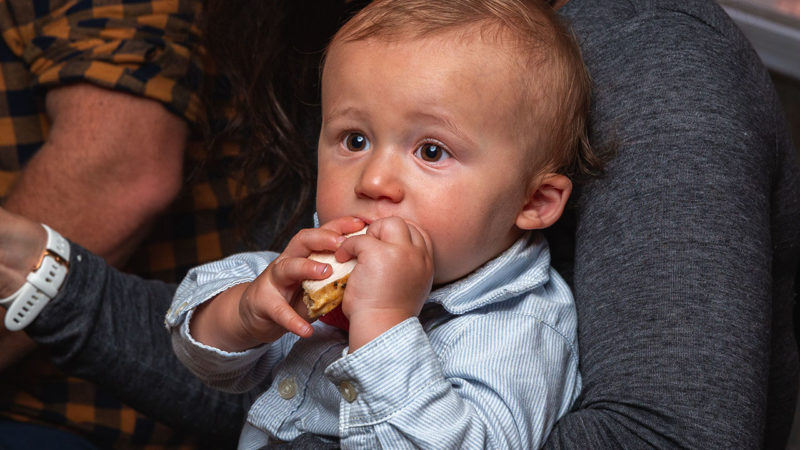Last Updated on March 29, 2021
In 2015, as ButcherBox founder Mike Salguero and his wife Karlene awaited the arrival of their first child, they started to become more thoughtful about the foods they were eating.
After learning about the potential health benefits of grass-fed beef, Mike soon found himself in someone’s living room picking out his very own $400 pile of meat from a cow share. An entrepreneur by nature, Mike recognized the potential opportunity of bringing the humanely raised, grass-fed cow share across the country. As Mike and Karlene welcomed their first daughter, Marley, Mike’s idea was already percolating into a new venture that eventually became ButcherBox, an online butcher shop delivering high-quality, sustainably-sourced meat, pork, chicken, and salmon.
Mike and Karlene have since welcomed two more girls, identical twins Ruby and Lucy.
Believers of the benefits of baby-led weaning, they decided to skip baby food and feed Ruby and Lucy real foods, beginning with steamed zucchini. They had their first ButcherBox steak before they turned one-month-old.
During the past four years — ButcherBox’s formative ones — the importance of being present for his children has been just as integral to the life of the CEO as the daily check-ins with financials and members of his management team.
Being raised without a father has significantly influenced Mike’s parenting philosophy, and he’s on a mission to change the tide for not only his family but the families of his employees, as well. Recently, Mike updated his email signature with a note informing everyone that his working style includes a big chunk of time each evening that is dedicated to his time with his family.
“I try to be home for dinner every night,” Mike adds. “Being home for dinner is very important to me and my wife.” In the past, Mike said he thought it was important to be the first guy in the office in the morning and the last to leave. “It was important to me that everyone saw that I was working. I now realize that I, along with everyone else, wasn’t really working, just trying to show up and make people think they were working hard enough.” Although Mike is emailing at later hours in the evening, he doesn’t expect responses in real-time. He believes that when employees work during the hours that fit their own, individual lifestyle, they are able to do their best work. He recently challenged the team at ButcherBox to experiment with their own email signatures that provide boundaries that protect their time out of the office.
Prioritizing his family is now more important than trying to live up to an outdated ideal of how many hours an executive should work, a value he is passionate the entire company embrace. Beginning at the time the company launched, Mike has always spent Fridays with his daughters, something he has since dubbed “Daddy Fridays,” a day where he brings the girls into the office.
“I’ve been doing this since ButcherBox began,” Mike said, reflecting during a recent Daddy Friday. “What’s been interesting is that it’s become the day I’m forced to think. When I’m sitting down with the girls, playing with toys, that’s when I have great ideas. That’s productive. Obviously, it’s not always easy to have a meeting with the girls, but it has many more positives than negatives.”
“Working smart,” is a concept that is discussed regularly at ButcherBox. “We measure on the outcome, not on the process. And so, if people want to coach little league in the afternoon, work from home with their kids on Fridays, or work remotely, we’re fully supportive,” Mike said.
“I think that allows people to be their best self, and ultimately, to do their best work.”
More than an opportunity for his daughters to spend time with him in the office, Daddy Fridays are, to Mike, a way to show his girls firsthand that women can run companies. “I don’t think that girls are taught at a young age that they can run companies,” Mike said. “But I’m trying to teach my girls that they can do what I do. It’s really important that they know anything is possible.”
Whether or not the girls grow up to start their own companies, there’s one business lesson they should always remember because it came from dad: It’s good business to put family first.
Dennis Keohane is a writer, editor, and former Editorial Director for ButcherBox with a passion for storytelling and food. Combining his love for high-quality ingredients with engaging narratives, he crafts content that inspires home cooks to explore new flavors, techniques, and the joy of cooking.



